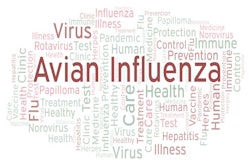
Another west African state has officially confirmed the presence of the H5N1 highly pathogenic avian influenza (HPAI) virus for the first time.
In the Republic of Guinea, poultry have tested positive for this virus at six farms near to the capital city, Conakry. Cases were detected between April 18 and May 10, according to a notification to the World Organisation for Animal Health (WOAH; formerly OIE).
Directly impacting around 120,500 poultry, each affected premises had between 3,000 and 57,000 birds. Five of the premises were semi-intensive farms with laying hens. For the remaining outbreak, the poultry type and farming system are not specified. All these outbreaks were in the south western region of Kindia, and WOAH reports put them within 10-20 km of Conakry.
In Guinea, the source of the infection is unknown.
More HPAI virus detected in South Africa
In the eastern province of Gauteng, another poultry flock has tested positive for the H5N1 HPAI virus.
According to the latest WOAH report, almost 43,000 birds died out of a flock of more than 76,000 in the Tshwane city area. In August of last year, this farm registered its first HPAI cases. Following the latest cases and culling of the remaining birds, this outbreak has now officially ended.
Since March of 2021, South Africa’s veterinary agency has registered 85 HPAI outbreaks linked to this virus serotype on commercial premises. Directly impacted have been almost 4.77 million birds, mainly in Western Cape and Gauteng.
Over the past year, WOAH has also been notified of HPAI cases linked to the H5N1 virus in South Africa’s wild birds and backyard poultry flocks.
With the latest report of an outbreak in 20 non-commercial poultry in the Sedibeng district of Gauteng, total outbreaks in this series have reached 66. As well as cases in wild birds, almost 2,000 poultry have been affected by these outbreaks over the last 12 months.
Algeria declares HPAI situation resolved
In January of 2021, the H5N8 HPAI virus serotype was detected for the first time in Algeria.
Following a first outbreak on an egg farm with 51,600 hens, further cases were confirmed in backyard flock of 400 birds in a second northeastern province the following month. Around the same time, a few wild birds in a forest in the same area tested positive for the virus.
As no further cases have been reported, Algeria’s veterinary authority has declared to WOAH that the HPAI situation has been resolved in both poultry and wild species.
Update on avian flu situation elsewhere in Africa
In Ghana, 102 HPAI outbreaks in poultry have occurred since the start of 2022, according to a senior veterinary official. While the virus continues to circulate in the country, he recently urged poultry farmers to maintain biosecurity measures.
Just this week, Nigerian poultry owners were urged to improve hygiene on their farms, reported local news agency NNN. Regional chairman of the Poultry Association of Nigeria stressed the importance of biosecurity to prevent the spread of diseases, focusing on the careful disposal of used poultry litter.
Between December of 2020 and the end of April this year, Nigerian authorities have registered with WOAH 381 outbreaks of HPAI in poultry linked to the H5N1 virus serotype.
Latest update from the United Nations’ Food and Agriculture Organization (FAO) puts the number of HPAI outbreaks in Sub-Saharan Africa’s domestic poultry at 360. This covers cases detected between October of 2021 and May 11, 2022. Ten of this region’s nations have registered one or more outbreaks over this period. Worst affected has been Nigeria, with 185 outbreaks linked to the H5N1 virus serotype, and one involving the H5N2 variant. Additionally, there have been 82 outbreaks in Ghana, according to FAO, and 68 in South Africa.
In mid-April, presence of the H5N1 serotype of the HPAI virus was detected for the first time in the Central African state of Gabon.
Since February of 2017, four HPAI virus serotypes — H5N1, H5N2, H5N6 and H5N8 — have been detected in a total of 19 countries in Sub-Saharan Africa, according to FAO.
View our continuing coverage of the global avian influenza situation.

















